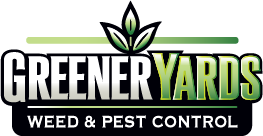Welcome to the Greener Yards Weed and Pest Control FAQ page. Here, we address common questions to help you understand our services and maintain a healthy, beautiful lawn.. If you'd like to know anything not listed below, give us a call at 678-900-6110
- What services do you offer?
- How often should I water my lawn?
- When is the ideal time to apply pre-emergent herbicides in Georgia?
- How can I prevent weeds from taking over my lawn?
- What are the most common lawn pests in Georgia?
- Do you offer organic lawn care options?
- How often should my lawn be fertilized?
- What is core aeration, and why is it important?
- Can you help with lawn diseases?
- Are your treatments safe for children and pets?
- How do I know if my lawn has a pest problem?
- What is the best mowing height for my grass?
- Do you offer mosquito control services?
- How can I improve my lawn's soil quality?
- What are the benefits of overseeding?
- How do I handle bare patches in my lawn?
- What is the difference between pre-emergent and post-emergent herbicides?
- How soon can I expect results after treatment?
- Do you require long-term contracts?
- How can I schedule a service or consultation?
What services do you offer?
We provide comprehensive lawn care services, including weed control, fertilization, pest management, and more.
How often should I water my lawn?
It's best to water your lawn deeply and infrequently, providing about 1 to 1.5 inches of water per week, preferably in the early morning.
When is the ideal time to apply pre-emergent herbicides in Georgia?
In Georgia, applying pre-emergent herbicides in early spring, before soil temperatures reach 55°F, helps prevent weed germination.
How can I prevent weeds from taking over my lawn?
Maintaining a healthy, dense lawn through proper mowing, fertilization, and watering practices is key to preventing weed infestations.
What are the most common lawn pests in Georgia?
Common lawn pests in Georgia include grubs, armyworms, fire ants, and mole crickets.
Do you offer organic lawn care options?
Yes, we offer organic lawn care programs tailored to your preferences and lawn's specific needs.
How often should my lawn be fertilized?
Fertilization frequency depends on the grass type and soil conditions, but generally, lawns benefit from fertilization 4 to 6 times per year.
What is core aeration, and why is it important?
Core aeration involves removing small plugs of soil to alleviate compaction, improve air exchange, and enhance nutrient absorption, promoting healthier grass growth.
Can you help with lawn diseases?
Yes, our team can diagnose and treat various lawn diseases, implementing effective strategies to restore your lawn's health.
Are your treatments safe for children and pets?
We use EPA-approved products and follow safety guidelines to ensure our treatments are safe for your family and pets.
How do I know if my lawn has a pest problem?
Signs of pest issues include irregular brown patches, increased bird activity feeding on insects, and visible insects or larvae.
What is the best mowing height for my grass?
Mowing heights vary by grass type; however, maintaining a height of 2.5 to 3 inches is generally recommended to promote healthy growth.
Do you offer mosquito control services?
Yes, we provide mosquito control treatments to reduce populations and enhance your outdoor comfort.
How can I improve my lawn's soil quality?
Incorporating organic matter, proper fertilization, and regular aeration can significantly enhance soil health and structure.
What are the benefits of overseeding?
Overseeding introduces new grass varieties, improves lawn density, and helps fill in bare spots, leading to a more resilient turf.
How do I handle bare patches in my lawn?
Address bare patches by identifying the underlying cause, then reseeding or sodding the area, followed by proper watering and care.
What is the difference between pre-emergent and post-emergent herbicides?
Pre-emergent herbicides prevent weed seeds from germinating, while post-emergent herbicides target existing weeds.
How soon can I expect results after treatment?
Results vary based on the service; some improvements are noticeable within a week, while others, like weed control, may take a few weeks.
Do you require long-term contracts?
No, we offer flexible service plans without binding contracts, allowing you to choose services that fit your needs.
How can I schedule a service or consultation?
You can contact us via phone or through our website to schedule a free consultation or service appointment.
